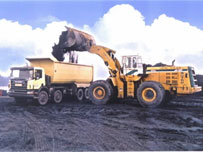
| Lawmakers reject lower taxes for natural resource exploitation | |
National Assembly members found it “strange” that the draft law on natural resources submitted to the parliament at its Tuesday (3 Nov) session reduces taxes on natural resource exploitation from current levels. According to the Natural Resources Ordinance amended in 2008, the exploitation of metal ores such as iron, manganese, titanium, gold, platinum and tin is taxed at 5-30 percent of output but the draft law lowers the figures to 5-25 percent. The draft proposes a 35 percent cap on taxes for natural forest wood, which is currently at 40 percent.
According to the deputies, lower taxes will not only cause losses for the state budget but also encourage people to overexploit natural resources. They suggested that the draft law be changed to maintain tax ceilings at current levels. The tax levels in the draft law fail to reflect the government’s policy to contain exploitation of non-renewable resources, they said.
The deputies also said that the tax amplitude presented in the draft is still too broad, and asked that it is made more specific, for example for different kinds of metal ores.
Deputy Nguyen Dinh Xuan from Tay Ninh Province that neighbors Ho Chi Minh City, and Ngo Van Minh from the central Quang Nam Province said the draft law should impose “significantly high taxes” on materials which are now Vietnam’ major exports, such as oil and coal, and include regulations to contain export materials in raw form. Xuan said it would be better if the draft law can discourage businesses from exporting the country’s raw materials, especially those that cannot be renewed.
Other countries are preserving their resources, and even buying from other countries to enlarge their stock, Minh said, “while Vietnam keeps boasting about its rich resources only to export them at low prices.”
Deputy Nguyen Minh Thuyet from the northern province of Lang Son disagreed with an article in the draft law that allows ore exploiters to be taxed based on the quantity of each metal collected after sorting. Thuyet said the tax amount then would depend on the “truthfulness” of the people doing sorting. He said the tax should be imposed directly on the quantity of ore exploited.
Some deputies suggested at the session that tax exemptions be granted to citizens using natural resources to meet daily needs, like gathering firewood or fishing. | |
| Tuoi Tre + Thanh Nien |
